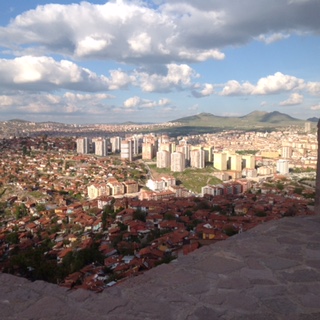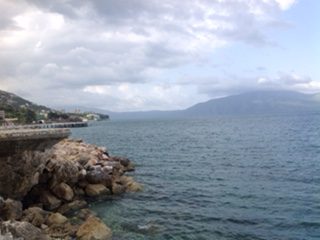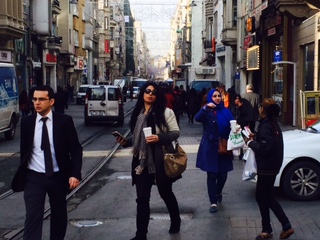TURKEY – AGAIN AT THE CROSSROADS
In the last months we did not get good news from Turkey. The only good news was the restart of EU accession talks parallel to the EU – Turkey agreement on refugees. But out of different reasons and because of different responsibilities both are not functioning well.
Bad news we got before the last military coup, the coup as such was particularly bad news and now again the news are worrying and depressing. Yes, that the coup failed, was very good news. Many coups in Turkey before did not fail and caused a political disaster. Good news was also the reaction of many citizens, media and all political forces who condemned and rejected that military intervention.

Is the political leadership missing a chance?
Does President Erdogan and does the government draw democratic (!) strength out of that reaction? They could and they should. As Mustafa Akyol wrote in the International New York Times: „If Mr. Erdogan is prudent, he will appreciate the support he received from the secular opposition – including the main Kurdish party – and stop seeing them as enemies.“ Otherwise Turkish democracy would be in jeopardy.
And Zeynep Tufekci wrote in the same paper, that the Internet saved Erdogan: „The role of Internet and press in defeating the coup presents a significant opportunity. Rather than further polarization and painting of all dissident as illegitimate, the government should embrace real reform and reverse its censorship policies……A free press and open internet have proved essential to everyone – even those at the height of power.“
The Gulenists behind the coup?
At present the Turkish authorities did not take up that opportunity, because everything is connected for them with Fethullah Gulen and the Gulenists which are supposed to undermine the state. Is there a parallel state as Mr. Erdogan is never tired of telling the world? Well he must know, as he was helped to gain power also by that movement. And it may be true, that Fethullah Gulen tried to manage or control him in times when he was prime minister. As I have been in contact especially with the Gulen media, for example Zaman, which where close to or part of the Gulenist movement I can confirm the influence and strength of that organization.

How far this influence goes or rather went is difficult to decide. But the coup may be a hint, that it was rather stronger than by many expected. The Turkish novelist Elif Shafak wrote in a comment to the recent events about the dark sides of the Gulenist movement: „Gulenist were active in the police, prosecution service and judiciary, often pursuing their own agenda.“ Even if Gulen himself was not the organizer of the coup he at least have had a spiritual influence. On the other hand to be a Gulenist cannot be a crime, not everybody who shares Gulen’s philosophy or religious orientation is supporter of a coup and wants to get rid of Erdogan including with illegal means. But what we see today is indiscriminate persecution of people by closing institutions who are supposed to support the Gulenist movement and a mass sacking of people from their jobs, especially in the media, education and science sector.
Dangerous radicalization
Moderation and objectivity seem not to affect the power and the people who are motivated and encouraged by the power in attacking many who are neither in favor of President Erdogan and his policies nor supporting a military intervention to interrupt democracy and personal freedoms. There is hardly space for political neutrality. This radicalization of a part of the citizens may be welcomed by those in power but is in clear contradiction to how a democracy is dealing with illegal activities. It is up to the state authorities and on basis of the constitution and the respective laws to act and to judge. And at least with the European understanding of law, no summary condemnation and sanctioning is allowed.
State of emergency
The decision to put the country under a state of emergency was expected and already de facto existing. It could be accepted, would it not be used to unfairly strengthen the grip of power by President Erdogan and the AKP government. When President Erdogan draws a comparison with the French state of emergency, so one has to see the big differences. Whatever attitude one has to the state of emergency in France, there was no mass sacking of Muslims in public services, there is no restriction on traveling abroad etc. The state of emergency in Turkey is in danger of coming close to what would have happened, if the military coup would have been successful. And that will create new tensions and divisions instead of healing the wounds of the last years.

What would be important is a fair and transparent trial for all those accused to promote actively a military coup. As Mustafa Akyol wrote in one of his comment: „Given the Gülem community’s hierarchical structure, all of this makes Mr. Gulen a prime suspect. Of course, the truth can come out only in a fair trial. Unfortunately Turkey is not good at those – especially given Mr. Erdogan’s control over the judiciary and the ferocious polarization in the country today“. Unfortunately.
Death penalty
A special case is the death penalty. This form of sentence was mostly used by the military itself after they stopped democratic developments, also in Turkey. It can be seen even as a typical instrument of undemocratic and dictatorial rule, especially if it is used for silencing political opponents. There are some democratic countries, who still have and practice the death penalty like the US. Although it may be used discriminatory, as many police and judicial actions, especially against the blacks, it cannot be seen as an instrument of power against political opponents. But, anyway, the European Union has a very clear position concerning the death penalty and made already its position clear.
EU – Turkey relations and the refugee agreement
When agreeing the „EU – Turkey Deal“ there was a decision to promote and strengthen the until then very slow and low-key accession negotiations. But already before the coup one had the impression that parallel to some progress one could also see a lot of steps backward in Turkey itself and also a rising skepticism in EU countries. The introduction of the death penalty could give the accession process the final end. Remains the question, if that would also make the refugees agreement irrelevant and a new influx of refugees would be started and and the return of refugees to Turkey would be halted.
For the moment Turkey will stay as an important NATO member and even with the rapprochement between Turkey and Russia, an exit from NATO (Turkxit) is highly unlikely. In that respect the link to the West will sustain. In addition, Turkey remains an important player in the whole region and also for the peace process and any conflict resolution in the region. And therefore as long as the conflict lasts, the refugee issue cannot be solved without Turkey.

For the moment Erdogan’s many intellectual and administrative opponents are rather in danger to go into prison and many intellectuals cannot leave the country. But it may easily be, that the Europeans will receive refugees from Turkey especially, but not exclusively, from the Kurdish population. Maybe the dominant political forces are even interested in some peoples exchange: to let opponents and critical citizens go towards the European Union and to receive and welcome Sunnis from Syria and elsewhere. The EU must be ready to grant asylum to those who are clearly politically persecuted without intending to provoke a total breakdown with Turkey. Human rights perspectives must be respected without political considerations.
In this connection of course also the question of visa liberalization has to be raised. Together with the agreement on refugees to be brought back to Turkey in exchange for refugees to relocated to Europe the EU promised the abolishment of visa for Turkish citizens. This promise to Turkey was connected to legislation in Turkey concerning human rights. In the mean time we have a changed situation with many violations of human rights in the aftermath of the military coup – as far we can see. In addition the sentiments and attitudes in many EU countries are fearful of visa liberalization and rather negative towards it. We do not know how things will develop, but for the moment this process seems to be interrupted and that may(!) provoke Turkey. But it may also be on the mind of Turkish politicians to have a break on the accession process.

Few days after the failed coup, the Vienna based organization NOW organized a conference on the EU – Turkey agreement in Athens (see separate report) Participants supported or criticized that agreement or its weak implementation, but they agreed not to break it from the EU before an alternative, especially a better one, is found. Turkey has different faces and roles. We have to regard Turkey as a candidate country, a partner in the refugee issue but also as a country in which we see a more and more problematic human rights situation. In any case Turkey remains an important regional factor. EU must combine a reasonable political strategy of promoting peace and security in the whole Middle Eastern area – and here Turkey is one important player – with a humanitarian position concerning the refugees but also the citizens of Turkey. The EU policies must be implemented irrespective of the nationality and origin of people in need – Syrians, Afghanis, Turks etc. And that must be the basic condition for keeping the refugee agreement „alive“.
